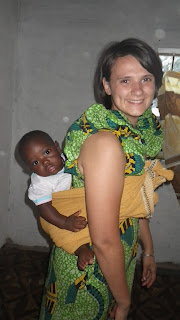There are a lot of things that I love about Gambian culture.
I love the sense of hospitality. I love that relationships are more important
than work. I have even grown to love greeting everyone I pass and asking them
how their family, morning, work and weather are all fairing.
Like any
culture, however, there is something that I don’t love, and it honestly
surprised me. When applying for Peace Corps, my recruiter asked me how I would
respond to women in traditional roles. I told her that I didn’t expect it to be
a problem. I’m from a big family, and my mom stayed home with us. I respect
women who stay home to care for their families. Of course, I believe women can
have careers and all that jazz, but I didn’t anticipate living in a culture
with traditional gender roles to be an upsetting challenge.
But it has been, and there’s more to it than traditional gender roles.
But it has been, and there’s more to it than traditional gender roles.
Caveat, I have met Gambian men who
are respectful and believe women to competent and equal. These are not the men
I am about to take about.
Women do
not have equal opportunity. Yes, legally, women can go to school, have a career,
obtain a driver’s license. But if you look at my school’s log of dropouts, the
vast majority are female students. The reasons listed for pulling the child out
of elementary school include helping with chores in the compound, babysitting
younger siblings, and early marriage. Yes, women can have careers. My school
has four female teachers and about twenty male teachers. That ratio is similar
in all fields here. Most teachers, nurses, cooks, restaurant owners, and
bankers are male. I’ve never seen a female shopkeeper or tailor. I’m told
Gambian women can have a driver’s license, but I have yet to see a female
behind the wheel.
If I am
honest, though, these aren’t things that upset me. I am upset that women,
denied these opportunities, work harder than anyone else early morning till
late night, sweeping, gardening, farming, collecting firewood, cooking,
laundering, pounding, fetching water, caring for the compound, and raising the
children, and all this isn’t considered work. Meanwhile I see many (admittedly
not all) men sit by drinking attaya, sleeping on the bantaba, and complaining
that dinner is late. Not to worry, though, because once dinner’s ready, they’ll
be served first while the women wait. I’ve heard a lot of nice lip service from
men about how women work hard, but I have hard time considering it anything
beyond lip service when they sit by watching them do it.
Soon I will
return to the US and begin my career teaching. I am excited to live
independently and relieved that I will soon go about my business without the
perpetual verbal harassment I have come to expect here. But there’s another
feeling there too. I’m not sure whether it’s guilt, anger, or heartache but
whatever it is, it comes when I think about the women and girls here whom I
have come to love.
I think
about my best Gambian friend. She’s her husband’s first and only wife, but she
doesn’t expect that to last. She tells me it is selfish to want a husband to
yourself, that women should share their husbands because there aren’t enough
men to go around. I think about her telling me she cannot come to an event in
the village because her husband wouldn’t like it, because if he found out, he
would become angry and beat her.
I think
about my little sister. She is in 5th grade. She’s smart, sassy,
sharp. She works hard and is serious about school. Her parents actually live in
another village, but she stays in our compound to help her grandmother and to go
to school. Her chores often steal her time to study. Her grandmother has an
unpredictable temper. Sometimes my sister has a fat lip.
I think
about another brother’s wife. She married him last year when she was in 11th
grade. She seemed serious about school and even had a European sponsor who was
supporting her schooling. When she came to our compound I asked her if she
planned to finish her last year of school. She told me of course. Shortly into
the school year, she became pregnant. Her baby was born just before the exams
she needed to finish high school. She says that maybe she’ll take the exams in
the future when her son’s older, but I’m not holding my breath.
Maybe there
will always be extremes. I know girls forced to marry men who could be their
fathers. I know women who are raped by their husbands repeatedly, but it’s not
considered rape because he is her husband. On the flip side, I know fathers who
have stood up for their daughters and intervened when their husbands abuse
them. I know husbands who genuinely love their wives and show them great
respect.
I don’t know what will happen to my
friend or my little sister, but I know what I want for them. I want my friend
to be in love with her husband and know what it is like to feel confident in
his love for her. I want my little sister to finish
school and pursue her heart’s desires. If her heart desires getting married,
staying in the village, and raising a family, all power to her. I’ll be very
proud. Whatever they do, I hope they know their dignity and their rights. I
want them to command the respect they deserve. I want them to seize
opportunities. I pray they experience joy. No, I don’t know what will happen,
but I know what they deserve.




